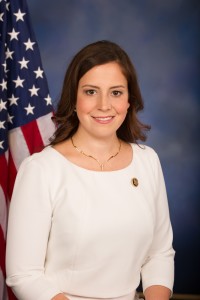Stefanik Introduces the Flexible Pell Grant for 21st Century Students Act
 From the office Congresswoman Elise Stefanik
From the office Congresswoman Elise Stefanik
Washington, D.C – Today, Congresswoman Elise Stefanik (R-NY-21) introduced H.R. 3180, the Flexible Pell Grant for 21st Century Students Act — common sense legislation that expands flexibility for Pell Grants so that these important education resources are available for qualifying students all year round.
“Over the past few months I’ve been working on this legislation as a result of concerns that were raised from my Higher Education roundtables throughout the district, and from Carole McCoy, President of Jefferson Community College,” said Congresswoman Stefanik. “Right now, Pell Grants are only available for qualifying students during the fall and spring semesters. By expanding the eligibility window to include summer classes and increasing the possible maximum Pell Grant award by 50 percent, we can make sure that low and middle income families have added flexibility to achieve a college degree. As the first member of my immediate family to graduate from college, making higher education more affordable and more accessible is a top priority of mine as a Member of the House Committee on Education and the Workforce. I am proud to introduce this commonsense legislation to help North Country families and students.”
Student demographics have changed dramatically in recent decades. Whereas the majority of students used to enroll in a four-year, full-time program fresh out of high school, an increasing number of students – “contemporary students” – are older, have a family, and work full- or part-time jobs. These students are looking to quickly and affordably earn a degree that will help them compete and succeed in the workforce.
Unfortunately, outdated higher education programs do not meet the needs of contemporary students. For example, while the Pell Grant provides support for more than one-third of all undergraduate students, the program fails to adequately support those who want to complete their studies more quickly by taking additional courses beyond the traditional academic year. Instead, students who receive Pell Grants are bound to a rigid system based on a six-year, two-semester timeline – discouraging many students from pursing higher education altogether.
To modernize the Pell Grant program for all students, Reps. Elise Stefanik (R-NY), Carlos Curbelo (R-FL), and Rubén Hinojosa (D-TX) have introduced the Flexible Pell Grant for 21st Century Students Act. This bipartisan legislation will help students complete a postsecondary education more quickly and at a lower cost.
What they’re saying:
Carole A. McCoy, President, Jefferson Community College: “The Flexible Pell Grant for 21st Century Students Act will positively impact low income students’ ability to meet their educational goals. With access to Pell during the summer months, students may continue their studies year-round and accelerate degree completion. We believe adult students, in particular, who desire to complete their degree and enter the workplace as quickly as possible will greatly benefit from the act. Additionally an increase in the annual Pell maximum helps to make higher education more affordable for the neediest students who work diligently throughout the year to obtain their educational credentials and graduate.”
Tony G. Collins, President, Clarkson University: “As an institution with more than 30% of our student body eligible for Pell awards, Clarkson University applauds Congresswoman Stefanik’s introduction of the Flexible Pell Grant for 21st Century Students Act. This legislation addresses the needs of contemporary students by giving them more options on when they complete degree requirements and gets them into the workplace faster. Clarkson students take a semester off to pursue internships or cooperative educational experience in order to apply classroom learning, gain practical skills, and confirm further specialization of knowledge in upper level courses. By providing year round flexibility in accessing aid, this Act allows students to stay on pace to graduate in four years or less and immediately compete for the best jobs.”
Kristine Duffy, President, SUNY Adirondack: “I support the Flexible Pell Grant for 21st Century Students Act introduced by Congresswoman Stefanik. Allowing our students to utilize PELL to continuously enroll through a summer session should support the Completion Agenda in a very tangible way and recognizes the need to support our under resourced students to achieve their goals. At SUNY Adirondack nearly 50% of our students receive a PELL grant and this legislation would remove one significant barrier to completion.”
Todd Moravec, Director of Student Financial Services, SUNY College at Plattsburgh: “By introducing the Flexible Pell Grant for 21st Century Students Act, Congresswoman Elise Stefanik is providing high-need students with a means to graduate faster and accumulate less student debt along the way.”
THE FLEXIBLE PELL GRANT FOR 21ST CENTURY STUDENTS ACT:
· Provides students the flexibility to draw Pell Grant funds at an accelerated pace in order to pay for additional courses within an award year.
· Encourages students to complete degrees more quickly, leading to less debt and faster entry into the workforce.
· Maintains maximum lifetime Pell Grant award eligible students can receive over the course of their education.
· Assists students in making informed decisions about their academic progress by directing the Secretary of Education to provide an individualized federal financial aid status reports to each student annually.
Posted: July 23rd, 2015 under Congressional News, Education News, Northern NY News.
